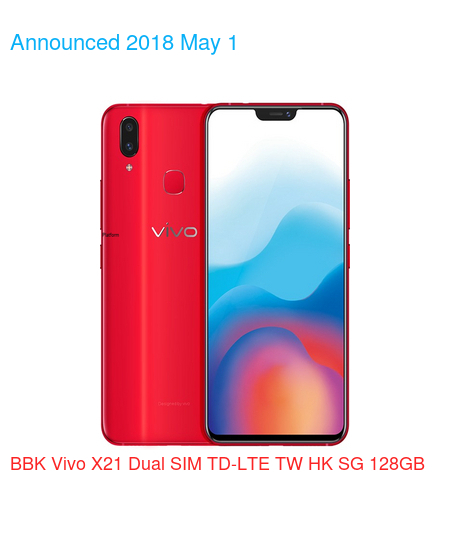| Brand | BBK |
| Model | Vivo X21 Dual SIM TD-LTE TW HK SG 128GB |
| Released | 2018 May 6 |
| Announced | 2018 May 1 |
| Hardware Designer | BBK Electronics |
| Manufacturer | BBK Electronics |
| General Extras | Haptic touch feedback |
| Device Category | Smartphone |
| Width | 74.78 mm |
| Height | 154.45 mm |
| Depth | 7.37 mm |
| Dimensions | 2.94×6.08×0.29 inches |
| Mass | 156.2 g |
| Platform | Android |
| Operating System | Google Android 8.1 (Oreo) |
| Software Extras | Voice Command , Navigation software , Intelligent personal assistant , Face Recognition |
| CPU Clock | 2200 MHz |
| CPU | Qualcomm Snapdragon 660 SDM660, 2017, 64 bit, octa-core, 14 nm, Qualcomm Adreno 512 GPU |
| RAM Type | LPDDR4 SDRAM |
| RAM Capacity (converted) | 6 GiB RAM |
| Non-volatile Memory Interface | Yes |
| Non-volatile Memory Capacity (converted) | 128 GB ROM |
| Display Notch | 1-notch |
| Display Diagonal | 159.5 mm |
| Resolution | 1080×2280 |
| Horizontal Full Bezel Width | 6.5 mm |
| Display Area Utilization | 85.2% |
| Pixel Density | 402 PPI |
| Display Type | AM-OLED display |
| Display Subtype | Super AM-OLED |
| Number of Display Scales | 16.8M |
| Scratch Resistant Screen | No |
| Graphical Controller | Qualcomm Adreno 512 |
| Dedicated Graphics Memory | 0.25 MiB |
| A/V Out | No |
| Audio Controller | Asahi Kasei AK4376A |
| Microphone(s) | stereo |
| Loudspeaker(s): | mono |
| Audio Output: | 3.5mm |
| Supported Cellular Bands | GSM850 , GSM900 , GSM1800 , GSM1900 , UMTS2100 (B1) , UMTS850 (B5) , UMTS900 (B8) , LTE2100 (B1) , LTE1800 (B3) , LTE850 (B5) , LTE2600 (B7) , LTE900 (B8) , LTE700 (B28) , TD-LTE2600 (B38) , TD-LTE1900 (B39) , TD-LTE2300 (B40) , TD-LTE2500 (B41) bands |
| Supported Cellular Data Links | GPRS , EDGE , UMTS , HSUPA , HSDPA , HSDPA 7.2 , HSPA+ 21.1 , LTE , LTE 100/50 , LTE 150/50 , LTE 300/50 data links |
| SIM Card Slot | Nano-SIM (4FF) |
| Complementary Phone Services | Voice transmission , Voice speaker , Vibrate , Speakerphone , ANC , HD Voice , VoLTE |
| Dual Cellular Network Operation | Dual standby |
| Sec. Supported Cellular Networks: | GSM850 , GSM900 , GSM1800 , GSM1900 |
| Sec. Supported Cellular Data Links: | GPRS , EDGE |
| Sec. SIM Card Slot | Nano-SIM (4FF) |
| Touchscreen Type | Capacitive multi-touch screen |
| Expansion Interfaces | TransFlash , microSD , microSDHC , microSDXC |
| USB | USB 2.0 |
| USB Services | USB charging , USB fast charging , USB Host , USB OTG 1.3 , USB PD |
| USB Connector | USB Micro-AB |
| Bluetooth | Bluetooth 5.0 |
| Wireless LAN | 802.11a , 802.11b , 802.11g , 802.11n , 802.11ac |
| Wireless Services | Wi-Fi Tethering , Wi-Fi Calling |
| FM Radio Receiver | No |
| Complementary Satellite Services | Simultaneous GPS , A-GPS , Geotagging , QuickGPS |
| Supported GLONASS protocol(s) | L1OF |
| Supported BeiDou system (BDS) | B1I BeiDou receiver |
| Camera Placement | Rear |
| Camera Image Sensor | CMOS |
| Image Sensor Pixel Size | 1.28 micrometer |
| Number of effective pixels | 12.2 MP camera |
| Aperture (W) | f/1.80 |
| Zoom | 1.0 x optical zoom |
| Focus | PD AF |
| Video Recording | 1920×1080 pixel |
| Flash | single LED |
| Camera Extra Functions | HDR photo , Slow motion video , Burst mode , Touch focus , Macro mode , Panorama Photo , Face detection , Face retouch |
| Aux. Camera Image Sensor | CMOS |
| Aux. Camera Number of Pixels | 5.0 MP aux. cam |
| Aux. Camera Aperture (W) | f/2.40 |
| Aux. 2 Camera Image Sensor | No |
| Aux. 3 Camera Image Sensor | No |
| Aux. 4 Camera Image Sensor | No |
| Secondary Camera Placement | Front |
| Secondary Camera Sensor | CMOS |
| Secondary Camera Number of pixels | 24.0 MP sec. cam |
| Secondary Aperture (W) | f/2.00 |
| Secondary Camera Extra Functions | HDR photo , Burst mode , Face detection , Face tagging , Face retouch |
| Sec. Aux. Cam. Image Sensor | No |
| Built-in compass | Yes |
| Built-in accelerometer | Yes |
| Built-in gyroscope | Yes |
| Additional sensors | FP sensor , L sensor , P sensor |
| Protection from solid materials | Yes |
| Protection from liquids | Yes |
| Battery | Li-ion polymer (LiPo) |
| Nominal Battery Capacity | 3200 mAh battery |
| Market Countries | HK , Singapore , Taiwan |
| Market Regions | Asia , Southeast Asia |
| Mobile Operator | Chunghwa Telecom Hong Kong CSL Mobile Limited SmarTone Mobile Communications Limited Taiwan Mobile |
| Added | 2024-06-20 |
Specifications data description of this 📱BBK Vivo X21 Dual SIM TD-LTE TW HK SG 128GB📱
Title: Specification of the Device: A Comprehensive Overview
Introduction
In today’s world, technology has become an essential part of our lives, and devices have become our constant companions. When it comes to choosing the right device, it is crucial to consider several factors, including the network, launch date, body, display, operating system, chipset, CPU, GPU, memory, camera, sound, comms, features, and battery. In this blog post, we will take an in-depth look at the specifications of a device and what they mean for the end-user.
Lineup
When it comes to devices, several brands and models are available in the market. Each brand has its unique lineup of devices, with some focusing on high-end specs, while others prioritize affordability. It is essential to choose a device that suits your needs and budget.
Design
The design of a device is an essential factor to consider when choosing a device. A well-designed device is not only visually appealing but also comfortable to hold and use. The body of the device should be made of durable materials that can withstand daily use.
Specifications
When it comes to specifications, there are several factors to consider.
🌐 Network: The network capability of a device determines the speed and reliability of the internet connection. It is crucial to choose a device with good network compatibility, such as 4G or 5G.
📅 LAUNCH: The launch date of a device is also essential as it affects its availability and price. A newer device typically has better specs and features than an older one.
🏋️ Body: The body of the device should be durable and lightweight. It should also have a comfortable grip, and the buttons should be easily accessible.
🌈 DISPLAY: The display of the device is another crucial factor to consider. It should have good resolution, brightness, and color accuracy.
🤖 OS 🛠️: The operating system and the chipset of the device determine its performance and compatibility. It is essential to choose a device with a reliable and fast operating system, such as iOS or Android.
🚀 Chipset 🔧: The chipset of the device determines its processing power and efficiency. It is crucial to choose a device with a fast and efficient chipset, such as Snapdragon or Exynos.
💪 CPU 🖥️: The CPU of the device determines its overall performance. It is essential to choose a device with a fast and efficient CPU, such as Octa-core or Hexa-core.
🎮 GPU 💻: The GPU of the device determines its graphics performance. It is crucial to choose a device with a powerful GPU, such as Adreno or Mali.
🧠 MEMORY 🗂️: The memory of the device determines its multitasking capabilities. It is essential to choose a device with sufficient memory, such as 4GB or 8GB.
📷 CAMERA 🎥: The camera of the device is another crucial factor to consider. It should have good resolution, low-light performance, and features such as autofocus and optical image stabilization.
🔈 SOUND 🎵: The sound quality of the device is essential for multimedia consumption. It is crucial to choose a device with good speakers and audio quality.
📡 COMMS 📶: The comms capabilities of the device determine its connectivity options. It is crucial to choose a device with good comms capabilities, such as Bluetooth, Wi-Fi, and NFC.
💡 FEATURES 🎁: The features of the device determine its usability and convenience. It is essential to choose a device with useful features, such as fingerprint scanner, facial recognition, and water resistance.
🔋 BATTERY🔌: The battery life of the device is an essential factor to consider. It is crucial to choose a device with a long-lasting battery, such as 4000mAh or 5000mAh.
Conclusion
In conclusion, choosing the right device requires careful consideration of several factors. By considering the network, launch date, body, display, operating system, chipset, CPU, GPU, memory, camera, sound, comms, features, and battery, you can choose a device that suits your needs and budget. We invite you to leave a comment and share your thoughts on this blog post.














